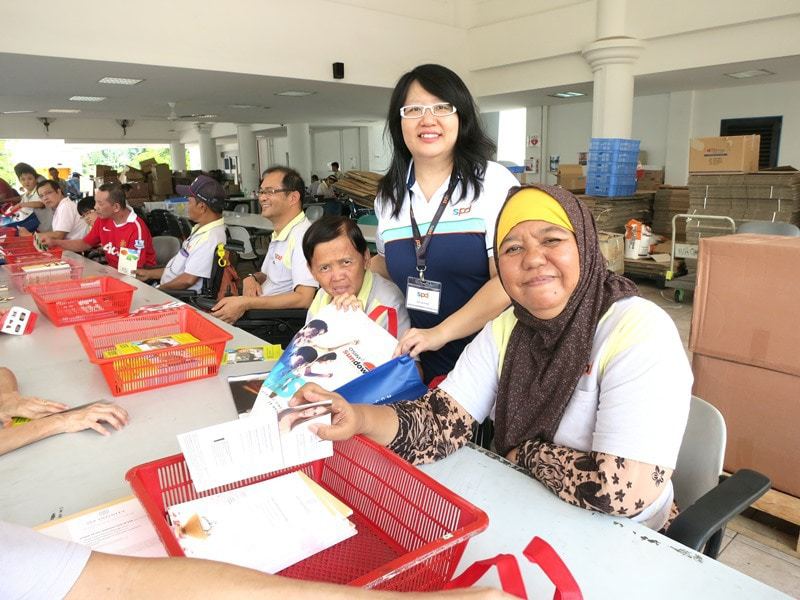Always with a ready smile, Tan Lee Huan is a senior workshop supervisor at SPD’s Sheltered Workshop, which offers supported employment and vocational training for people with disabilities, largely seeking sub-contract work such as packing, letter-shopping and product tagging the trainees can engage in. She has been with the SPD family for almost 14 years, having joined in September 2002. We catch up with Lee Huan to find out more about her work at SPD.
Q: What were you doing before you joined SPD?
LH: I was in an administrative position in a statutory board. I wanted to try an entirely different line, perhaps in the charitable sector or social service sector, and so joined SPD as a workshop supervisor.
Q: What is a day in the life of Tan Lee Huan, the senior workshop supervisor, like at SPD?
LH: Every day, I would schedule, plan, and co-ordinate with our customers on current and in-coming projects. I will then organise the work for our trainees to ensure successful and punctual completion of the projects.
So you can say that I would be there from the point of receiving the customers’ products to our delivery to them. Management of clients and caregivers is an integral aspect of my role.
Q: What do you like most about your work?
I feel happy when I see the trainees improving functionally and cognitively over time, no matter how small the progress. Also when we receive positive feedback from customers pleased with the quality of our work, and especially when projects are completed within a tight deadline through the collective effort of the trainees, supervisors and volunteers.
Q: What are the challenging aspects?
Training the trainees to complete work tasks that are a little more complex can be challenging. I will need to analyse the work tasks and work process to ensure the flow is smooth, effective and done accurately, all the while keeping in mind the customers’ requirements and timeline.
I will also need to be creative in my coaching methods to ensure that the trainees learn and retain what is being taught in spite of their functional and cognitive challenges.
Q: Share with us a memorable experience.
Recently, I coached a trainee with intellectual disabilities on a task he had difficulty handling. I spent some time coaching him and by the time I could see improvements in him, it was already the end of the day before a weekend. When he came back on the Monday, I was happy to see he could still remember what to do and was able to do it relatively well. He was beaming with pride and joy when I praised and encouraged him.
When I spoke to his caregiver later in the day, I found out that the trainee practised hard on the task over the weekend with home materials so that he would be able to do well in his work. I was really touched. It’s times like this that give me a sense of satisfaction, knowing that a trainee is keen to learn and improve.
Q: What do you want other people to know about the Sheltered Workshop?
Through the SPD Sheltered Workshop’s vocational training, trainees have the opportunity to improve functionally and cognitively, as well as learn work discipline and appropriate behaviour in a workplace setting. The workshop provides a routine and structure to our trainees’ lives, and the trainee also receives an allowance.
Here, the trainees get to interact with their peers and volunteers, which gives them a chance to be more active socially. There are outings too where the trainees get to visit places of interest with our volunteers and staff, places which they may not have a chance to go on their own due transport and financial constraints.
Our trainees can provide good, quality service, and also benefit from the work provided at the Sheltered Workshop. I hope that companies can see that and consider engaging our services.





